The types of Chinese TeaTea Information:
Chinese tea can be classified into five distinctive categories: white, green, oolong, red and post-fermented. Others add categories for scented and compressed teas. All of these come from varieties of the Camellia sinensis plant. Most Chinese teas are consumed in China and are not exported, except to Chinese-speaking communities in other countries. Green tea is the most popular type of tea consumed in China. Within these main categories of tea are vast varieties of individual beverages. Some researchers have counted more than 700. Others put the number at more than 1,000. Some of the variations are due to different strains of the Camilla plant. The popular Tieguanyin, for example, is traced back to a single plant discovered in Anxi in Fujian province. Other teas draw some of their characteristics from local growing conditions. However, the largest factor in the wide variations comes from differences in tea processing after the tea leaves are harvested. White and green teas are heat treated (simplified Chinese: 杀青; traditional Chinese: 殺青; pinyin: shā qīng) soon after picking to prevent oxidization, often called fermentation, caused by natural enzymes in the leaves. Oolong teas are partially oxidized. Black and red teas are fully oxidized. Other differences come from variations in the processing steps. Green Tea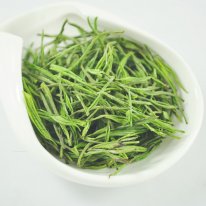 Green Tea: An Ji Bai Cha Green tea is also called unfermented tea. It is made with the new shoots of appropriate tea trees as raw materials, by applying the typical techniques of inactivation, rolling and drying. According to the drying and inactivation techniques, it is sub-divided into stir-fried green tea, roasted green tea, sun-dried green tea and steamed green tea. Green tea has the characteristics of "green leaves in a clear soup with a strong astringent taste ". It is the tea category with the longest history (more than three thousand years) and also the one with the largest output in China. The production areas are mainly distributed in central eastern provinces such as Zhejiang, Anhui and Jiangxi. Famous green teas include: West Lake Dragon Well Tea, Xinyang Maojian Tea and Biluochun Tea. Black Tea (Red Tea)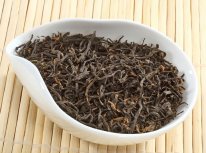 Black Tea: Bi Luo Chun Hong Cha Black Tea is also called fermented tea. Only the new shoots of tea leaves are suitable for use as the raw material for making this tea. It is exquisitely made through the typical technical processes of wilting, rolling, fermentation and drying. Its infusion is mainly red in tone. Hence what is known as black tea elsewhere is known as red tea in China. As the second largest tea category in China, it is divided into the subcategories: Gongfu Black Tea and Smashed Black Tea. Famous brands include Dianhong Red Tea and Yixing Red Tea. Oolong Tea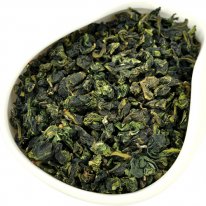 Green Tea: Tie Guan Yin Oolong Tea is especially popular with tea connoisseurs of south China and Chinese expatriates in Southeast Asia. Oolong Tea is also called blue tea, and is an unfermented tea. It is a tea category with some unique and distinctive characteristics. Oolong tea, as a blend of green tea and red tea, has qualities of both green tea and red tea. It not only has the thick and fresh flavor of red tea, but also has the pleasant fragrance of green tea. It is affectionately known as green leaves with a red edge. Oolong tea decomposes fat, resulting in weight loss and greater fitness. It is regarded as a beauty and fitness product in Japan. Exemplary brands of Oolong tea include: Wenshan Baozhong Tea, Anxi Tieguanyin, Dongding Wulong Tea and Wuyi Dahongpao. White Tea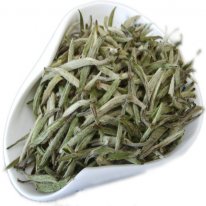 White Tea: Bai Hao Yin Zhen White tea is uncured, unfermented, fast-dried green tea. It is a speciality of Fujian province. It got its name from the recourse of poor Chinese of offering boiled water to guests if they didn't have any tea, which they called "white tea" (the word for white can mean plain in Chinese). Thus they would save face and come across as routinely hospitable. As might be imagined white tea is lighter in color and flavor than other teas. A couple of famous Fujianese white teas are Baihao Yinzhen (Baihao is a place name and Yinzhen means Silver Needle) and Bai Mudan (White Peony). Yellow Tea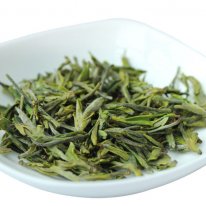 Yellow Tea: Huo Shan Huang Yellow Tea is produced by letting damp tea leaves naturally yellow. It has an original smell, which could be mistaken for red tea if it is cured with herbs, but its taste is most similar to green and white teas. Yellow Tea is also a term used to decribed the top-quality tea served to the emperor, because the imperial color has traditionally been yellow. Junshan Yinzhen is China's most famous yellow tea. It is made in Junshan in Hunan Province and Yinzhen means silver needle, probably a reference to the tiny white hairs on the tea leaves. Reprocessed TeaThese products, which are made by taking teas from the categories above as materials and reprocessing them, is called reprocessed tea. The product range includes scented tea, pressed tea, instant tea, extracted tea, fruit tea, medicinal tea and health tea, which have a variety of flavors and effects. Scented Tea (Herbal Tea) 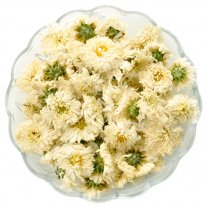 Herbal Tea: Huang shan Chrysanthemum Jasmine Tea is the most famous scented tea in China. Scented teas include Jasmine tea and Pearl Orchid scented tea; pressed teas include Tuo Tea and Liubao Tea; instant teas include the brand Green Source . Scented tea is made by mixing and aromatizing tea leaves with scented flowers, letting the tea assimilate the fragrance of the flowers by taking advantage of the absorptivity of tea leaves. The dhool (a collection of tea leaves prior to drying) used for aromatization of a scented tea is mainly roasted green tea and a small amount of slender and tender stir-fried green tea. When processing the scented tea, the dhool and fresh fragrant flowers are piled up layer upon layer so that tea assimilates the fragrance of flowers. When the tea has absorbed the flowers' scent new flowers are added and the process repeated. The degree of fragrance of a scented tea depends on the quantity of flowers being used and the time of aromatization. The ordinary scented tea sold in the market is generally only aromatized once or twice. Scented tea has a strong fragrance, which can help in sobering up after being drunk. It is especially liked by people in north and Northeastern areas of China. In recent years, it has also been sold abroad. Examples are Jasmine Tea, Pearl Orchid Scented Tea, Rose Tea and Sweet-Scented Osmanthus Tea. |
- Company Info
- About Us
- Chinese Tea Wholesale
- Site Map
- Links
- Customer Service
- My Account
- Chinese Tea Forum
- Contact Us
- Live Chat
- Company Policies
- Payment Methods
- Shipping Guide Return Policy
- Privacy Policy
- Terms of Use
- Tea Info
- The culture of Chinese Tea
- The history of Chinese Tea
- The types of Chinese Tea
- More Info...
- Join Our Community


- Falsi d'autore
- Gemälde reproduktionen
- Reproduction tableau


